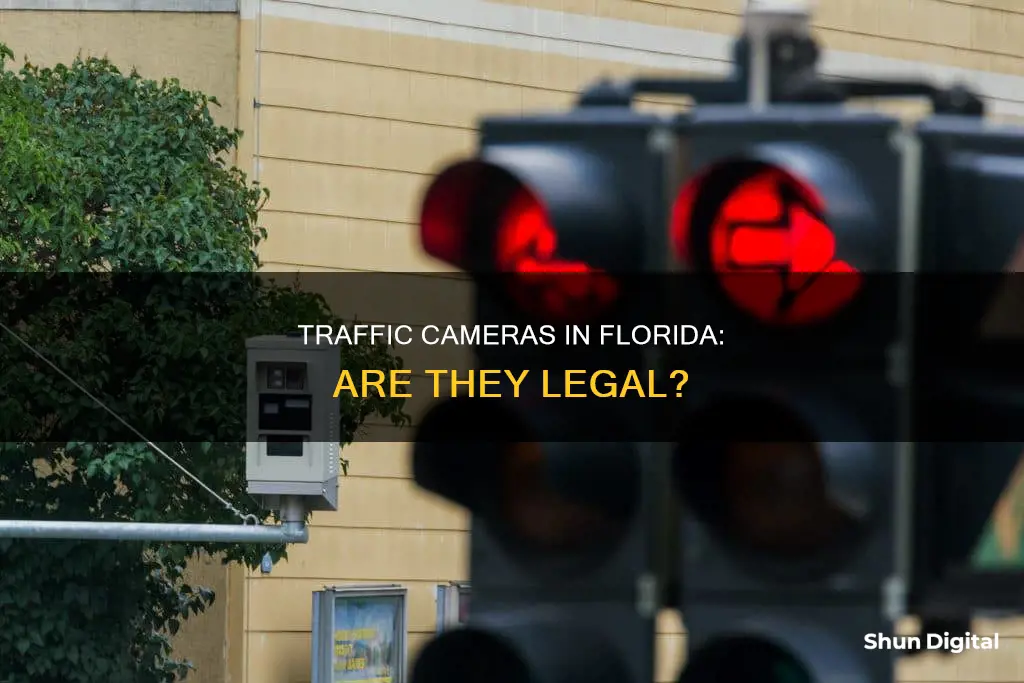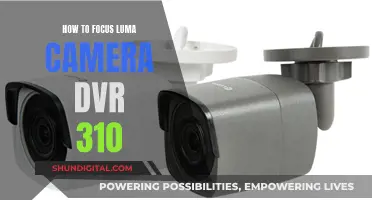
The use of traffic cameras in Florida has been a highly debated topic in recent years. While some argue that these cameras improve road safety and reduce crashes, others claim that they are merely a way for local governments to generate revenue through fines. Florida's Mark Wandall Traffic Safety Act, enacted in 2010, authorized the use of red-light cameras to catch drivers running red lights, but there have been multiple attempts to repeal this law. So, are traffic cameras currently legal in Florida, and what are the implications of their use?
| Characteristics | Values |
|---|---|
| Are traffic cameras legal in Florida? | Yes, the Florida Supreme Court ruled in 2017 and reaffirmed in 2018 that red light cameras are legal. |
| Who can use them? | Cities and counties have been able to use them since 2010. |
| What are they used for? | To catch red light runners by installing them at intersections to record license plates and issue civil citations. |
| How much are the fines? | Fines are typically $158 but can rise to $262 if the ticket is not paid after the first notification. |
| How many jurisdictions use them? | 63 Florida jurisdictions use them, with 58 local governments operating more than 500 red light cameras. |
| How many violations are issued? | Municipalities statewide have sent out more than 1 million notices of violation annually for the past four years. |
| Are they effective? | Opinions vary. Some say they have helped reduce crashes and save lives, while others say they have made streets more dangerous and increased rear-end collisions. |
What You'll Learn

Florida's Mark Wandall Traffic Safety Act
The Act authorises the installation of cameras at intersections to record license plates, allowing law enforcement to issue civil citations with a $158 fine to the registered owners of vehicles that run red lights. This uniform standard for the use of cameras in traffic enforcement has been widely praised by communities for its effectiveness in reducing crashes and improving road safety.
However, the Act and the use of red-light cameras have also faced opposition and criticism. Some argue that the cameras are solely a revenue-generating tool for local governments and camera companies rather than a safety measure. There have been attempts to repeal the law, with critics claiming that it does not effectively modify unsafe driving behaviour and unfairly penalises working-class individuals. A bill sponsored by Representative Anthony Sabatini in 2020 aimed to repeal the Mark Wandall Traffic Safety Program law, but it did not advance past the Senate.
Despite the controversy, the Florida Supreme Court has upheld the legality of red-light cameras, rejecting arguments that cities gave too much power to external vendors to determine traffic violations. The ruling affirmed that the use of cameras falls within state law, emphasising the importance of pedestrian and road safety.
The Mark Wandall Traffic Safety Act has undergone some amendments to refine its implementation. Changes enacted in 2013 included provisions for right-turn-on-red violations, modifications to Notice of Violation procedures, and updates to requirements for issuing Uniform Traffic Citations. The Act also designates a portion of the funds from traffic violations to the State and various trust funds supporting trauma centres and brain and spinal cord injury research.
Understanding Stereo Mode in Camera: Enhancing Your Photography
You may want to see also

Red-light cameras and public safety
In Florida, the use of red-light cameras is governed by the Mark Wandall Traffic Safety Act, which was passed in 2010. The Act allows cities and counties to install cameras at intersections to record license plates and issue civil citations to the registered owners of vehicles that run red lights. The fine for a red-light violation captured by these cameras is $158.
There are mixed opinions on the effectiveness of red-light cameras in improving public safety. Some studies suggest that red-light cameras reduce the number of vehicles running red lights, leading to fewer cross-street collisions. For example, a study in Virginia showed a 67% reduction in the number of drivers running red lights after the implementation of red-light cameras. Additionally, several Florida cities, including Orlando, Seattle, Gallatin, and Garland, have reported a decrease in crashes and traffic violations after implementing red-light camera programs.
However, other studies and real-world observations suggest that red-light cameras may not significantly improve public safety. For instance, a study in Houston, Texas, found no evidence that red-light cameras reduced the total number of vehicle accidents, injuries, or incapacitating injuries. When Houston removed its red-light cameras, angle accidents increased by 26%, but all other types of accidents decreased by 18%. This suggests that the drawbacks of red-light cameras may cancel out their benefits.
The impact of red-light cameras on public safety is complex, and there are valid arguments on both sides of the debate. While red-light cameras may deter some drivers from running red lights, they can also lead to an increase in rear-end accidents as drivers suddenly stop to avoid fines. Additionally, there are concerns about the effectiveness of these cameras in truly improving road safety, as well as criticisms that they are used as a revenue-generating tool for local governments.
In recent years, there have been efforts in Florida to repeal the Mark Wandall Traffic Safety Act and remove red-light cameras. A bill sponsored by Republican Anthony Sabatini of Lake County, House Bill 6009, aimed to repeal the Act and give communities until 2024 to remove all camera equipment. Sabatini argued that red-light cameras have not saved lives or helped anyone in Florida. A 2018 study by Florida International University also concluded that the use of red-light cameras showed little benefit in reducing crashes when compared to intersections without automated enforcement.
Despite these efforts, the Florida Supreme Court ruled in 2018 that red-light cameras can remain, preserving the state's red-light camera law. However, the use of these cameras varies across different cities in Florida, with some choosing to discontinue their red-light camera programs.
Advanced Car Camera Systems: Braking Innovations and Features
You may want to see also

The legality of third-party vendors
The legality of red light cameras in Florida has been a contentious issue for some time. The cameras are typically owned by third-party companies that forward data and footage to the relevant authorities, who then decide whether to issue a citation. This has led to some debate over the legality of delegating such responsibilities to external vendors.
In 2017, Florida's House approved a statewide ban on red light cameras, but this was soon overturned by the Florida Supreme Court, which ruled that the cameras are legal and can be used in the interest of public safety. The Court's decision addressed the controversy over the use of third-party vendors, finding that it was legal for cities to utilise red light cameras installed, maintained, and monitored by private, third-party companies. The Court agreed with the Second and Third District Courts of Appeal, which held that since a traffic enforcement officer makes the determination about whether probable cause for a violation exists and whether to issue a citation, there is no unauthorised delegation of police power.
Despite the Court's ruling, some cities in Florida have chosen to end their use of red light cameras, while others continue to use them. For example, in Palm Beach County, only Boynton Beach currently uses these cameras.
The use of red light cameras has been praised for reducing crashes and saving lives, with many drivers supporting their use. However, critics argue that they are a way for local governments and camera companies to generate revenue, with little benefit to road safety. There is also the concern that they may increase rear-end collisions as drivers suddenly brake to avoid a ticket.
The future of red light cameras in Florida remains uncertain, with a bill proposed in 2021 to repeal the Mark Wandall Traffic Safety Act, which gave cities and counties the power to use the cameras.
Machines and Computers: Can They 'See'?
You may want to see also

Red-light camera fines
Red-light cameras are legal in Florida, and tickets from these cameras are considered civil citations. The usual cost of a red-light camera ticket in Florida is $158, but this can vary across counties. If you fail to pay the ticket after the first notification, the fee rises to $262, and three points are added to your driving record.
Florida's Mark Wandall Traffic Safety Act gave cities and counties the power to install cameras at intersections to record license plates and issue citations to the registered owners of vehicles that run red lights. The Act was passed in 2010 and named after a man killed by a motorist who ran a red light.
While some Florida cities and counties have chosen not to use red-light cameras, many local governments in the state have adopted their use. Supporters of red-light cameras argue that they reduce road accidents and save lives. Critics, on the other hand, claim that they are a way for local governments to raise revenues and do not improve driving behaviour.
There has been a recent push to repeal Florida's red-light camera law, with a proposed bill giving communities until mid-2024 to remove all camera equipment. Despite this, the Florida Supreme Court ruled in 2018 and 2019 that red-light cameras are legal and can be used in the interest of public safety.
Focusing Techniques for Sharp Landscape Photography
You may want to see also

Opposition to red-light cameras
Red-light cameras are a contentious issue in Florida, with several failed attempts to repeal the law allowing their use. Here are some of the main arguments against red-light cameras:
Public Opposition
A high majority of residents and visitors will despise the program, seeing it as a cash grab rather than a safety measure. This is reflected in the fact that red-light and/or speed cameras have lost 36 out of 40 public votes so far, with voters rejecting them 90% of the time. At least sixteen states ban automated ticketing due to such public opposition.
Profit over Safety
The Public Information Research Group (PIRG) published a report in 2011 detailing how and why red-light cameras are often abused for profits, not safety. For-profit camera companies are motivated by money-making, not road safety. Involving these companies in traffic enforcement virtually guarantees that profits will be prioritised over safety.
Increased Crash Rates
Red-light cameras often increase total crash rates at intersections. A statewide report released in Florida in 2017 stated that crashes went up at red-light camera intersections. Tampa's 2016 audit indicated that 19 out of 22 red-light camera intersections had more accidents, with a total increase of 39%. A 2013 report from Philadelphia showed a 27% increase in collisions involving injuries at red-light camera intersections over ten years.
Unfair Fines
Red-light camera fines are very regressive, especially for lower-income citizens. While a middle-class executive might view the fine as a minor annoyance, it can be punishingly large for service workers in minimum-wage jobs with families to support. Some may be unable to pay and face further sanctions, such as suspended licenses, creating a situation akin to a debtor's prison.
Economic Damage
Red-light cameras are costly, often charging cities at least $4,000 per month per camera. This money could be better spent elsewhere, and circulating this money within the local economy would be far more beneficial than sending it to the often out-of-state camera companies.
National Trend
Red-light camera programs are decreasing nationwide. A five-year "pilot" program in New Jersey was shut down in 2014 due to high public opposition, and 80 California cities have dropped or prohibited them. Florida would be following a broader trend by discontinuing its use of red-light cameras.
Why You Should Try Manual RAW Photography
You may want to see also
Frequently asked questions
Yes, the Florida Supreme Court ruled that red light cameras are legal and may be used in the interest of public safety.
Red light cameras are photo enforcement technology that automates the process of recording drivers committing a red light violation. When a driver passes over a sensor at a red light, a camera is activated, taking pictures of the driver and their front license plate. An enforcement program then issues a citation, which is mailed to the registered owner of the vehicle.
If you receive a ticket and do not contest the citation, you must pay the fine within 30 days. If you miss this deadline, your fine will increase, and you will incur court costs and points on your license.
Yes, there are ways for drivers to fight these tickets. If your car was recently sold, stolen, or being borrowed by someone else, the citation can often be dismissed with an affidavit. It is recommended to consult a local attorney for further guidance.
Red light cameras in Florida capture violations such as failing to make a complete stop when turning right on red, passing through an intersection on a red light, or stopping in the middle of an intersection during a red light.







